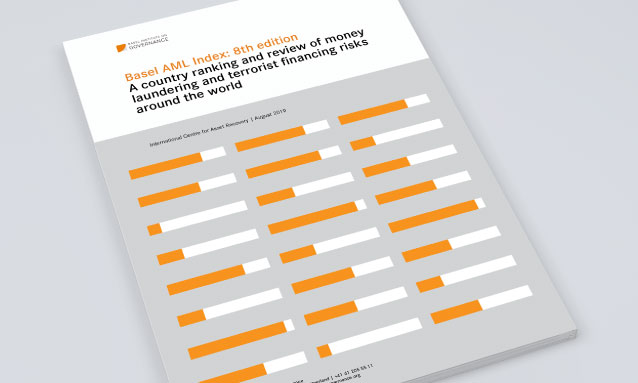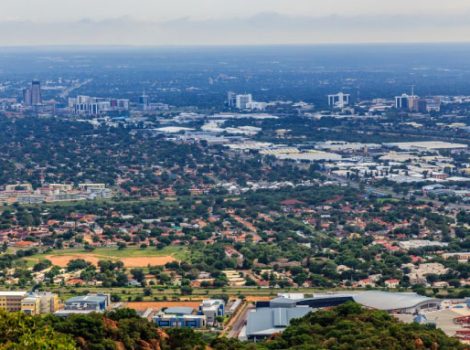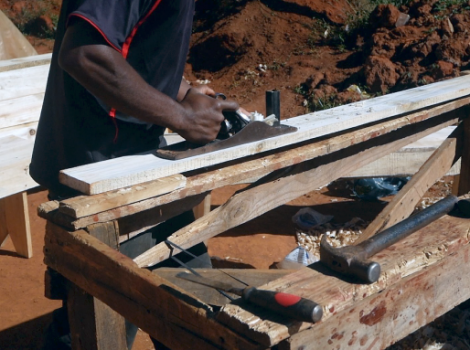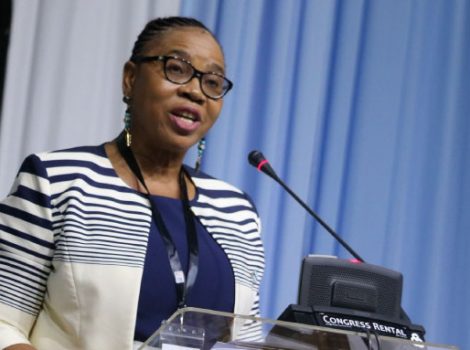
Since 2012, the Basel Institute on Governance in Switzerland has annually released the Basel Anti-Money Laundering Index. The Index measures money laundering and terrorism financing (ML/TF) risk in countries, but not the actual volume of money laundering and terrorism financing activity.
Developed and maintained by the internationally renowned International Centre for Asset Recovery, which is part of the Basel Institute, the Index is the only independent, research-based framework which ranks countries according to their ML/TF risk. Data to assess the risk scores for each country is sourced from various organisations including Freedom House, Transparency International, the World Bank, World Economic Forum, Tax Justice Network, and the influential Financial Action Task Force. The broad range of sources used gives the Basel AML Index greater credibility over other assessments used to rank the performance of countries in combating money laundering and terrorism financing.
The Index assesses a country’s performance across five core elements that operate to prevent money laundering and terrorism financing:
- The quality of a country’s AML/CFT framework
- Level of bribery and corruption
- Financial transparency and standards, particularly the level of financial secrecy
- Public transparency and accountability
- Legal and political risks.
The Index recently released in July this year covers 2019. Last year, Botswana was ranked 76th out of 141 countries and jurisdictions assessed, as recorded in the public edition of the report, with an overall score of 5.06. The risk rating is based on the min-max method with a rating scale of 0–10, where 10 indicates the highest level of ML/TF risk. In the same year, the worst performer was Afghanistan with a rating of 8.16 while Estonia ranked the best coming in at 141 with the lowest score of 2.36.
Botswana outperformed FATF members India (5.15), Japan (5.16), Malaysia (5.25), Mexico (5.20), Saudi Arabia (5.33), Russia (5.51), Turkey (5.76), and China (6.76). It scored substantially better than larger African countries, notably Nigeria (6.88) and Kenya (7.18).
In sub-Saharan Africa, Botswana ranked just behind South Africa (4.83) and Ghana (4.89). Countries with a risk score of 5.0 or above are regarded as having a significant money laundering and terrorist financing risk. Botswana’s rating is however close to the lower end of the scale, which classifies it as having a medium level of ML/TF Risk according to the Basel AML Index.
While the Index is not a contest between countries, it does enable political leaders to have an understanding of how their countries are performing compared to others and how the performance is changing over time. Botswana ranked 60th in 2018 with a score of 5.40. In 2017, it ranked 74 with an overall score of 6.02. Its current ranking, which is an improvement of 16 places from the previous year, is a significant achievement given the small size of Botswana’s economy, population and the resources available to it. Botswana is clearly set on a continuous path of improvement with its AML/CFT framework.
A lot of hard work has been done for which the Government and all public institutions involved should be proud of. There, however, remains room for further improvement, particularly in the area of capacity building for those involved in the investigation and prosecution of financial crimes, and with the implementation of the very far reaching Financial Intelligence Act and Regulations by both the financial and non-financial business and professional sectors.
The continued improvement in Botswana’s AML/CFT framework not only gives foreign investors greater confidence when deciding to invest in the country but also substantial leverage to the leaders of Botswana when they present their case to the European Union (EU) on why Botswana should be removed from its list of high-risk ML/TF countries. It is worth noting that the EU has not listed as high-risk ML/TF any of the other FATF member countries that Botswana beat in the Basel AML Index.
Interesting too was the overall assessment of countries in Europe by the International Centre for Asset Recovery with the Basel AML Index report stating;
“Despite having a generally lower risk than the global average, the region’s biggest deficiency is the quality of AML/CFT frameworks. This could indicate that AML/CFT does not enjoy the same level of priority in Europe than other accountability and transparency factors captured by the Index.”
The report cited Belgium, Cyprus, Malta, the Netherlands, Spain, and the UK as being major money laundering destinations according to the United States. Botswana was listed by the EU for having a weak AML/CFT framework, but it appears that many European countries have a similar issue in compliance with international AML/CFT standards. Except in those countries, the ML/TF risks are far greater due to their larger economies which have substantial banking systems, a higher threat of organised crime, particularly in drug trafficking and human trafficking; closer proximity to drug-producing countries and a large number of foreign fighters who have returned from Syria.
COVID-19 has disrupted Government and business activities in 2020 but it also presents opportunities. All Government departments, government-owned businesses and the private sector should use any spare time that has been created by shutdowns to improve corporate governance systems, particularly those relating to the prevention of money laundering and terrorism financing. If that is undertaken in a cooperative manner, then Botswana can expect greater achievements to be reported by the Basel Institute on Governance in its 2020 report.
Source: http://www.mmegi.bw/index.php?aid=86719&dir=2020/august/21
*Michaela Powell-Rees & Chris Douglas, on behalf of Merero Partners, a boutique advisory firm based in Botswana that offers Corporate Finance, Management Consulting and Risk Advisory Services. For more information on AML/CFT training and consultancy services in Botswana, please contact the firm at enquiries@merero.co.bw.



